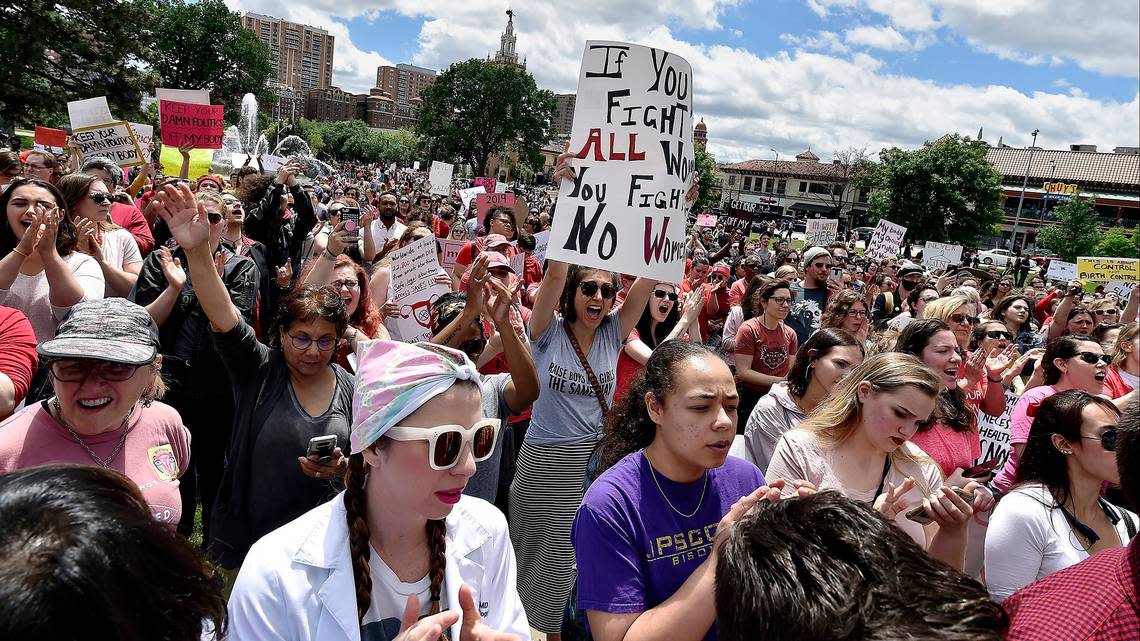Missouri ballot can’t call abortions ‘dangerous’ on petition questions, judge rules

- Oops!Something went wrong.Please try again later.
A Cole County judge on Monday struck down Missouri Secretary of State Jay Ashcroft’s language for a series of proposed ballot measures that seek to restore abortion access in the state.
The Republican secretary of state, who is running for governor in 2024, had crafted summaries for the proposed initiatives that would have asked voters to “allow for dangerous, unregulated, and unrestricted abortions.” Judge Jon Beetem’s ruling tosses that language and includes new summaries for six of the proposed ballot measures.
“The Court finds that certain phrases included in the Secretary’s summary statement are problematic in that they are either argumentative or do not fairly describe the purposes or probably effect of the initiative,” Beetem said in his ruling.
Monday’s order comes after the ACLU of Missouri challenged Ashcroft’s language for the proposed ballot measures, which abortion rights supporters are looking to place on the 2024 ballot. The ruling allows supporters to move forward with the petitions with new language drafted by the courts. Beetem, in a separate ruling, upheld the fiscal estimates of the ballot proposals, rejecting claims from two Republican state lawmakers and an anti-abortion activist that the ballot measures would cost the state billions.
All of the new ballot summaries would ask voters, in part, to “establish a right to make decisions about reproductive health care including abortion and contraceptives with any governmental interference of that right presumed invalid.” Beetem, in his ruling, rewrote all six of the petitions with each question based on the contents of the proposal. Some would allow Missouri to ban abortion after “fetal viability” while others would allow a 24-week ban.
Anthony Rothert, the director of integrated advocacy at the ACLU of Missouri, celebrated the ruling in a statement Monday, saying that Ashcroft’s summaries were “the language of a biased politician seeking the support of special interest groups.”
“The new summaries go a long way toward fairly describing the right to make reproductive health care decisions without government interference,” Rothert said. “Missourians believe in limited government and should have the chance to vote for reproductive rights.”
Ashcroft’s office indicated plans to appeal the decision.
“We will not stand idly by while the courts hide the effects of this amendment and mislead the people as to what they may very well be voting on next year,” Ashcroft said in a statement.
Ashcroft, in his statement, specifically took issue with summaries of two of the petitions, which would ask voters to amend the constitution to “declare government funding of abortion is not required.” The Republican said that this is “categorically false,” indicating that he believes legalizing abortion would require costs to government entities.
In Beetem’s ruling on the challenge to the petitions’ fiscal note summaries, he found that the estimates crafted by Republican Auditor Scott Fitzpatrick, which estimates that the petitions would have no cost to the state, were fair. The ruling denies a challenge from state Rep. Hannah Kelly, a Mountain Grove Republican, state Sen. Mary Elizabeth Coleman, an Arnold Republican, and Kathy Forck, an anti-abortion activist from New Bloomfield, who argued that the petitions would cost the state billions.
Yamelsie Rodríguez, the president and CEO of Planned Parenthood of the St. Louis Region and Southwest Missouri, said in a statement Monday that Missouri politicians have “held hostage the right to reproductive freedom” for decades.
The state’s most marginalized communities, including young people, those financially insecure, Black and brown people and transgender and “gender-expansive communities” have felt the “brunt of harmful policies and face the most barriers to quality care,” the statement said.
“Now, as a path to building abortion access becomes clearer, Planned Parenthood recommits to centering those communities — and not just rebuilding the same system that left so many behind,” the statement said. “Planned Parenthood stands ready to work with partners to build meaningful, lasting, and equitable abortion access for all Missourians.”
The ongoing legal challenges have delayed abortion rights supporters from collecting signatures on the different versions of the state constitutional amendment that would restore abortion rights in Missouri. The procedure is almost entirely banned after the U.S. Supreme Court struck down the federal right to an abortion last year. Anna Fitz-James, a retired St. Louis doctor, submitted the proposals in March.
Tom Bastian, a spokesperson for the ACLU of Missouri, said in a text to The Star that abortion rights supporters likely would not begin collecting signatures on the petitions until the appeals window closes and the campaign has chosen which version of the petition to move forward with.

